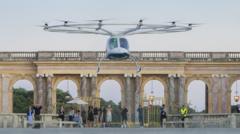
Electric Flying Taxi Startups Face Significant Challenges
The emerging electric vertical take-off and landing (EVTOL) aircraft industry is experiencing substantial financial and technological hurdles, with several prominent companies struggling to bring their innovative flying taxi concepts to market.
Volocopter, a German company, exemplifies these challenges. Originally planning to provide electric flying taxi services during the Paris Olympics, the company instead conducted only demonstration flights. Currently facing potential insolvency, Volocopter is in talks with China’s Geely, which may acquire an 85% stake in exchange for $95 million in funding, potentially moving future manufacturing to China.
Lilium, another German EVTOL developer, has encountered even more severe difficulties. The company, known for its unique 30-electric-jet design, recently entered insolvency proceedings after failing to secure a €100 million loan from the German development bank. Despite having claimed orders and memoranda of understanding for 780 jets, Lilium’s future remains uncertain.
Vertical Aerospace, a British company, represents another case of financial strain. Founded in 2016, the company has made some progress with its VX4 aircraft, completing both remote-controlled and initial piloted tests. However, setbacks include a prototype crash and the withdrawal of Rolls Royce as an electric motor supplier. The company is now exploring potential investment from Jason Mudrick, though founder Stephen Fitzpatrick is reluctant to lose control.
Amid these challenges, some experts remain cautiously optimistic. Bjorn Fehrm, an aerospace consultant, suggests that Airbus’s CityAirbus NextGen project appears more stable, benefiting from the company’s substantial resources and engineering expertise. He also notes that well-funded US startups like Joby and Archer might successfully bring their aircraft to production.
The EVTOL industry faces multiple obstacles beyond initial development. Key challenges include:
1. Regulatory approval
2. Manufacturing capabilities
3. High development and operational costs
4. Uncertain market demand
Fehrm highlights significant operational challenges, particularly regarding pilot costs and battery maintenance. Batteries need replacement multiple times per year, adding substantial expense.
Interestingly, the current investment landscape reflects a speculative mindset. As Fehrm humorously notes, many investors were motivated by a fear of missing “the next Tesla” – hoping to back a potentially revolutionary transportation technology.
The future of electric flying taxis remains uncertain. While the concept promises flexibility, reduced noise, and lower emissions compared to traditional helicopters, the path to commercial viability remains complex. Initial routes are likely to connect airports and city centers, but profitability remains a significant question mark.
As these companies navigate financial challenges, the EVTOL industry stands at a critical juncture, with success depending on technological innovation, strategic investment, and market acceptance.







